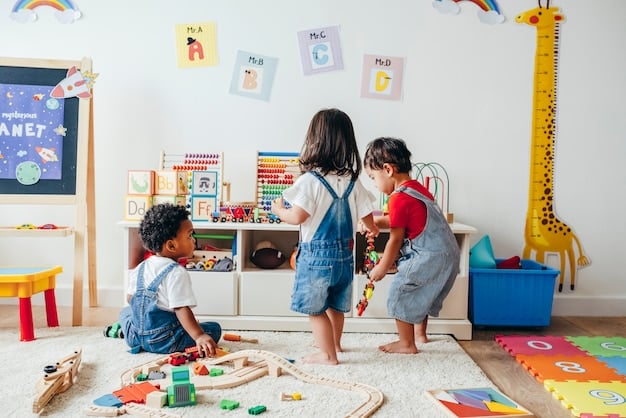Daycare Certification
 The journey into establishing or working in a #daycare facility is both a rewarding and responsible one. This credential is not merely a regulatory hurdle; it's a testament to a provider's commitment to quality, #safety, and the #developmental needs of children. For parents, certification is a key indicator of trust and professionalism. For aspiring and current childcare professionals, it's a foundational element for a successful and impactful career. This ultimate guide will navigate the essentials of daycare certification, exploring its various forms, profound benefits, and the general steps to achieving it, drawing upon the wealth of knowledge available through resources like Childcareed.com.
The journey into establishing or working in a #daycare facility is both a rewarding and responsible one. This credential is not merely a regulatory hurdle; it's a testament to a provider's commitment to quality, #safety, and the #developmental needs of children. For parents, certification is a key indicator of trust and professionalism. For aspiring and current childcare professionals, it's a foundational element for a successful and impactful career. This ultimate guide will navigate the essentials of daycare certification, exploring its various forms, profound benefits, and the general steps to achieving it, drawing upon the wealth of knowledge available through resources like Childcareed.com.
What is Daycare Certification?
Daycare certification refers to the process by which a childcare facility or individual provider is recognized by a governing body (usually state or local) as meeting specific minimum standards required to operate legally and provide care for children. These standards typically encompass a wide range of criteria, including #health-and-safety protocols, #staff-qualifications and training, staff-to-child ratios, nutritional requirements, educational program components, and the physical environment of the facility.
The primary goal of daycare certification is to ensure that children are cared for in environments that are safe, nurturing, and conducive to their healthy development and learning. It provides a framework for quality and accountability in the #early-childhood-education sector. While specifics vary significantly from one jurisdiction to another, the underlying principle remains the same: protecting and promoting the well-being of young children.
Types of Daycare Certifications and Credentials
The landscape of daycare and childcare certifications can seem complex, as requirements differ by state and sometimes even by county or city. However, several common types of credentials and recognitions exist within the field:
-
State Childcare License: This is often the most fundamental requirement for legally operating a daycare center or family childcare #home. Licensing involves meeting a broad set of state-mandated regulations. Childcareed.com often emphasizes the importance of understanding your specific state's licensing requirements as the first step. These requirements cover aspects from physical space per child to #background-checks for all staff.
-
Child Development Associate (CDA) Credential™: Offered by the Council for Professional Recognition, the CDA is a nationally recognized credential for #early-childhood- #educators. While not always a substitute for state licensing for a facility, it is a highly respected individual certification that signifies a provider's competence in working with young children. Many online platforms, including resources linked through or discussed on Childcareed.com, offer training hours towards the CDA. It focuses on six competency standards:
- Establishing and maintaining a safe, healthy learning environment.
- Advancing physical and intellectual competence.
- Supporting social and emotional development and providing positive guidance.
- Establishing positive and productive relationships with families.
- Ensuring a well-run, purposeful program responsive to participant needs.
- Maintaining a commitment to professionalism.
-
National Association for the Education of Young Children (NAEYC) Accreditation: This is a voluntary accreditation that signifies a higher standard of quality. NAEYC accreditation is a rigorous process that involves self-study, an on-site visit, and ongoing reporting. Programs that achieve this are recognized for their excellence in early childhood education. While a facility accreditation rather than an individual certification, the staff within such centers often hold advanced certifications and training.
-
State-Specific Certifications or Quality Rating and Improvement Systems (QRIS): Many states have their own tiered systems (QRIS) that recognize and rate childcare programs based on quality standards that often exceed basic licensing requirements. Participation can lead to higher ratings, increased funding opportunities, and greater parental trust. Training and professional development, often accessible through resources like Childcareed.com, are key to moving up these tiers.
-
Specialized Certifications: Beyond general daycare certification, individuals can pursue specialized certifications in areas like infant and #toddler care, special needs care, first aid and CPR (often a mandatory component of basic licensing), and curriculum development. These specialized trainings enhance a provider's skills and marketability.
The Profound Benefits of Daycare Certification
Obtaining daycare certification and related credentials offers a multitude of benefits for providers, children, families, and the community:
- Enhanced Child Safety and Well-being: Certified facilities are regularly inspected and must adhere to stringent health, safety, and nutritional standards, reducing the risk of accidents and illness.
- Improved Quality of Education and Care: Certification often requires staff to have specific educational qualifications and ongoing professional development, leading to more effective teaching practices and a richer learning environment. Childcareed.com provides numerous courses that contribute to these ongoing development hours.
- Maryland Requirements for Becoming a Home Daycare Provider
- Infant Daycare Part 1: Training and Certification
- How to Start a Daycare with Success
- How to Start a Daycare with the Right Qualifications
- A Comprehensive Guide to Opening an In-Home Daycare in South Carolina
- How to Become a Home Daycare Provider in Georgia
- Your Guide to Starting a Licensed Home Daycare in Georgia
- Become a Licensed Home Daycare Provider in NY & Earn Your CDA with EIP Scholarship
- Legal Steps, SIDS Certification, and Safety Training in Daycare Made Easy
- How to Start a Daycare in Pennsylvania
- What Certifications Do I Need To Open A Daycare In Georgia